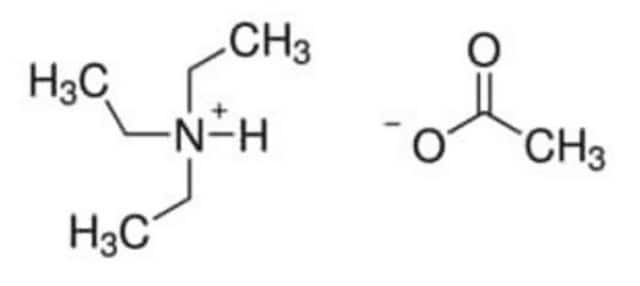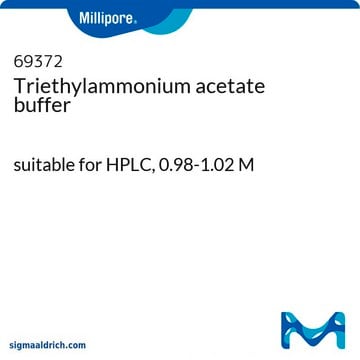56778
Triethylammonium-phosphat -Lösung
suitable for HPLC, 0.95-1.05 M
Synonym(e):
Pufferlösung 1 M pH 3.0, TEAP
About This Item
Empfohlene Produkte
Form
liquid
Konzentration
0.95-1.05 M
Methode(n)
HPLC: suitable
Brechungsindex
n20/D 1.358-1.362
Dichte
1.045-1.600 g/mL at 20 °C
UV-Absorption
λ: 210 nm Amax: ≤0.30
λ: 220 nm Amax: ≤0.20
λ: 230 nm Amax: ≤0.10
λ: 250 nm Amax: ≤0.04
λ: 500 nm Amax: ≤0.02
Lagertemp.
2-8°C
SMILES String
OP(O)(O)=O.OP(O)(O)=O.CCN(CC)CC
InChI
1S/C6H15N.H3O4P/c1-4-7(5-2)6-3;1-5(2,3)4/h4-6H2,1-3H3;(H3,1,2,3,4)
InChIKey
UNXNGGMLCSMSLH-UHFFFAOYSA-N
Suchen Sie nach ähnlichen Produkten? Aufrufen Leitfaden zum Produktvergleich
Anwendung
Ähnliches Produkt
Lagerklassenschlüssel
10 - Combustible liquids
WGK
WGK 3
Choose from one of the most recent versions:
Analysenzertifikate (COA)
Don't see the Right Version?
If you require a particular version, you can look up a specific certificate by the Lot or Batch number.
Besitzen Sie dieses Produkt bereits?
In der Dokumentenbibliothek finden Sie die Dokumentation zu den Produkten, die Sie kürzlich erworben haben.
Unser Team von Wissenschaftlern verfügt über Erfahrung in allen Forschungsbereichen einschließlich Life Science, Materialwissenschaften, chemischer Synthese, Chromatographie, Analytik und vielen mehr..
Setzen Sie sich mit dem technischen Dienst in Verbindung.






